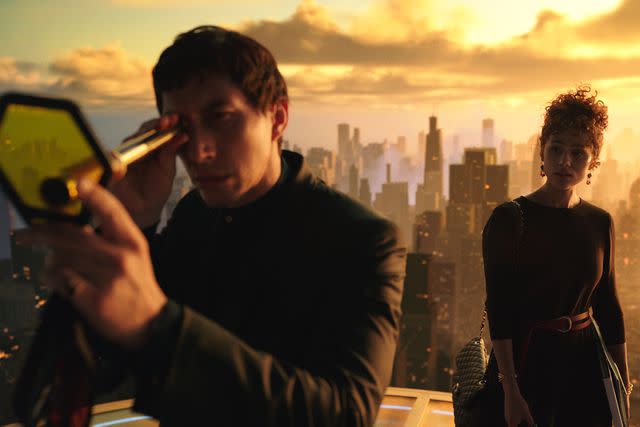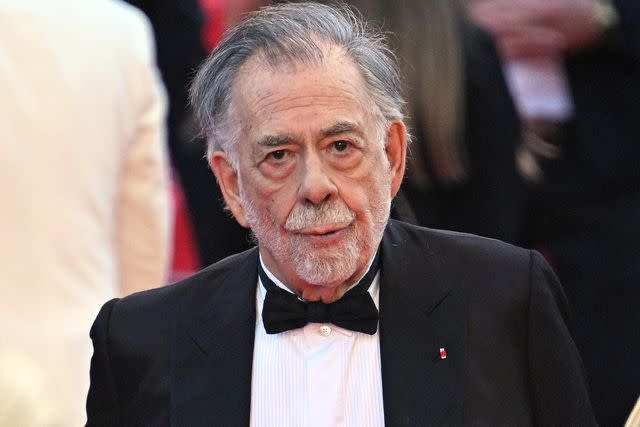Francis Ford Coppola's “Megalopolis” is bloated and unforgivably dull
Adam Driver leads this plodding drama that can’t find its center.
Despite being nearly three hours long, more substantive sentences have probably been written about what Megalopolis might be than what is actually in the script.
Francis Ford Coppola changed cinema as we know it, and his Godfather films will remain hallmarks of American filmmaking. But his latest film (and possibly his last) is a stain on his legacy. Somehow Megalopolis manages to be both chaotic and unspeakably boring.
Coppola melds Ancient Rome with modern-day New York, which is a stab at commentary on America’s own declining empire (look out for the “Make Rome Great Again” sign and the pointed line about politicians only needing to be entertainers). It’s a noble aspiration, if only the film actually said anything coherent.

American Zoetrope
Adam Driver in 'Megalopolis'Cesar Catilina (Adam Driver) is at war for the soul of his city. When he discovers new entity Megalon, which is some sort of chemical or building material (it's truly never clear), he pushes to create Megalopolis, a utopia open to all. But his dream depends on a murky property battle between him and Mayor Cicero (Giancarlo Esposito). Cicero seems likely to win out, thanks to his cronies, but things get complicated when his daughter, Julia (Nathalie Emmanuel), asks for a job with Cesar and ends up falling for him. It’s a tale of feuding families straight out of Shakespeare, but utterly lacking in the bard’s poetry and wit.
There's also the Crassus clan, led by Hamilton Crassus III (Jon Voight), the aging owner of New Rome's bank. He has a clown of a son, Clodio (Shia LaBeouf), who is hungry for power and money. Then, there's Wow Platinum (Aubrey Plaza), a gold-digging broadcast journalist who marries Crassus for access to his coffers and connections. This is still less than half of the characters who appear in the film, but I'll spare you the rest since they are fairly pointless.
These individuals compete for power, resources, and love in a muddled narrative that includes a silly, sterile love story, sci-fi imaginings that employ elements of futurism and the Bauhaus movement, and a tale of corruption and backstabbing that somehow sucks all the intrigue out of such themes. It’s a film that revels in its excess, drawing parallels to the gladiator games of ancient Rome and the gluttony of wealth — but all of that is not even shot interestingly.

American Zoetrope/Megalopolis/Mihai Malaimare
Adam Driver and Nathalie Emmanuel in Francis Ford Coppola's 'Megalopolis'And it's not just the manic storytelling or the pastiche of design styles (togas meet 1920s gangster suits meet Art Deco architecture meet contemporary New York streets meet unimaginative sci-fi chic) that make Megalopolis such an unholy mess. Somehow, Coppola also manages to cultivate horribly wooden performances from his stable of talented actors. Driver looks like he's waiting for someone to put him out of his misery, while Emmanuel plays a bland, forgettable ingenue whose party-girl turned philanthropist feels vapid if only because she’s so dreadfully underwritten.
Want more movie news? Sign up for Entertainment Weekly's free newsletter to get the latest trailers, celebrity interviews, film reviews, and more.
Related: Francis Ford Coppola says Megalopolis isn't 'woke,' features actors 'who were canceled'
Esposito at least tries to have fun with some of Cicero’s malevolence, and Plaza tries vainly to strike an over-the-top tone that leans into the story's absurdity. LaBeouf and Voight are both problematic entities to cast in a film at this point, and to make that worse, they seem to potentially be just playing versions of themselves. While LaBeouf’s Clodio is an unpredictable, solipsistic youth, Voight plays a doddering, confused old man who has aged far past relevancy. How did Coppola, a man who virtually discovered Al Pacino and Robert De Niro and directed them to award-worthy performances, come to this?
And all that is without mentioning the film’s troubling gender roles and gross sexual dynamics at play. The film may be set in the future but its views on sexuality, men and women, and power are hopelessly stuck in the past.

Kristy Sparow/Getty
Francis Ford Coppola at the 2024 Cannes Film Festival premiere of 'Megalopolis'Still, Megalopolis’s greatest sin is not any of these glaring problems, but rather how profoundly boring and bloated it all is. The dialogue, written by Coppola, alternates between riffs on flowery philosophy and statements that are so dumb I have to wonder how the actors delivered them with a straight face. "Steel, steel, steel," Dustin Hoffman's Nush “The Fixer” Berman chants in an opening scene, setting the tone for the nonsensical drivel to come. The moment is the first of many unintentional laughs and cringey moments.
For all this vision and build-up to Megalopolis as Coppola’s unhinged magnum opus, I at least expected something a little bats---. Something so bad it’s good, an experience you could give yourself over to. But instead, it only prompted me to check my watch. It's sad, really, that Coppola could pour so much money, time, and heart into something so disastrously awful.
Related: Chloe Fineman's impression of Melania Trump got her a role in a Francis Ford Coppola film
His vision for the possibility of a utopia and human collaboration for good is admirable. If I can offer a proverbial olive branch to the film, it is this: In a time where there is ample fodder for dystopian visions of the future, it is, at least, heartening to see one that is optimistic. But Megalopolis grants Coppola a dubious honor. In addition to his being the mastermind behind two of cinema's greatest achievements, he's also now the architect of one of its worst. Grade: F
Read the original article on Entertainment Weekly.
